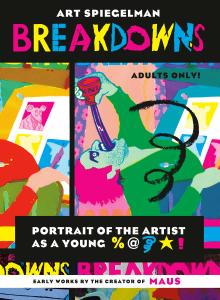
Breakdowns
Breakdowns is the chronicle of Spiegelman’s story, featuring vignettes of the people, events, and comics that shaped him. Art Spiegelman will appear on Crowdcast to discuss Breakdowns. Join the event at: https://www.crowdcast.io/e/wbf-breakdowns. Before the event begins, you will see a countdown and the event image.
Breakdowns is told in three ways—in 20 pages of comix that give us the story of his rebellious adolescence, a section on the work he did in the 1970s as an underground comix artist (this book brings back into circulation—and restores—the work of his first book, Breakdowns, out of print for 30 years), and an 8-page essay in which Art looks at the role of comics in the 1970s and how, in ways he didn’t understand until much later, it was already coalescing into a medium whose resurgence now is evident everywhere.
Art Spiegelman

Art Spiegelman is one of the world’s most admired and beloved comic artists, best known for his Pulitzer Prize-winning Holocaust narrative, Maus. Born in Stockholm in 1948, Spiegelman began studying cartooning in high school and drawing professionally at age sixteen. He studied art and philosophy at Harpur College before joining the underground comics movement in the 1960s. Spiegelman taught history and the aesthetics of comics at the School of Visual Arts in New York from 1979 to 1986, and in 1980 he founded RAW, the acclaimed avant-garde comics magazine, with his wife, Françoise Mouly. Honors Spiegelman has received include induction into the Will Eisner Hall of Fame and the Art Director’s Club Hall of Fame. In 2005, he was named one of Time magazine’s 100 Most Influential People. He was made an Officier de l’Ordre des Arts et des Lettres in 2007, and in 2011 he was awarded the Grand Prix at the Angoulême International Comics Festival. In 2015, he was elected to the American Academy of Arts and Letters, and in 2018 he became the first comic artist to receive the Edward MacDowell Medal. His art has been exhibited at museums throughout the world, including the Pompidou Center in Paris, the Ludwig Museum in Cologne, the Vancouver Art Gallery, the Jewish Museum in New York City, and the Los Angeles Museum of Contemporary Art.
